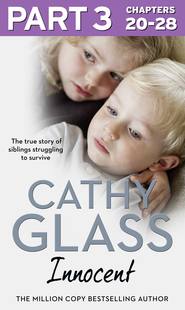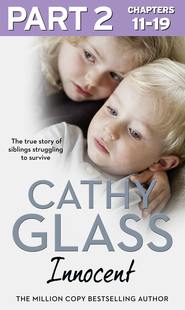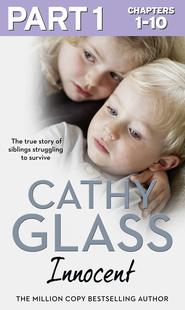По всем вопросам обращайтесь на: info@litportal.ru
(©) 2003-2024.
✖
Cathy Glass 3-Book Self-Help Collection
Автор
Год написания книги
2018
Настройки чтения
Размер шрифта
Высота строк
Поля
There are an incredible number of opportunities for children in modern-day affluent societies to learn all manner of skills and indulge in many hobbies – ballet, football, gym, ice-skating, piano, violin lessons, etc. But sometimes parents, wanting their children to be accomplished, sign them up for a ridiculously high number of activities, as well as expecting them to achieve academically. It is often the professional middle classes (with the income) who turn their children into performing seals, ferrying them every evening from one club or activity to another, with barely a breathing space in between.
I’m not saying ballet or piano lessons are going to turn your child into a juvenile delinquent, but make sure you don’t overload your child and have unattainably high goals. Clubs and activities should be fun for your child, and for your child’s personal accomplishment and pleasure, not a merit badge for you to pin to your coat to show others.
One close friend of mine, who had waited a long time to have her child, did what she thought was best by enrolling her daughter in virtually everything that was available from a very early age. As soon as the child could walk she was attending tumble tots, ballet, gym, swimming and trampoline classes, and by the time she had started school, piano, violin and trumpet lessons had been added, tucked in between various clubs and after-school activities, and home tuition in English, French and Maths. My friend genuinely believed she was giving her daughter the best start in life by providing her with all the opportunities she herself hadn’t had as a child. Rewards were given as incentives for obtaining grades and badges and passing exams; and the pressure on the child, while not obvious at the time, must have been enormous.
I remember feeling something of a failure for not providing my children with all the opportunities my friend’s daughter had, but by the age of ten her daughter was becoming very difficult and challenging in her behaviour. By the age of fourteen she had completely rebelled and was doing anything and everything that would upset or hurt her mother. She refused to go to school, got into drugs, alcohol and under-age sex, and ultimately got into trouble with the police. Having spent years on overload and under pressure to fulfil her mother’s (too high) expectations, she’d been set up for failure, as well as having had no time to simply be a child and explore her own identity. Sadly at the age of sixteen she became pregnant, and her poor mother, having hoped for so much, was left with nothing but to try to pick up the pieces and support her daughter as best she could.
The 3Rs work miracles
As ‘big fish’, children of this age tend to think they no longer need adult care and supervision, when the truth is they need it more than ever. If children at this age are left to get on with things, which their confidence and self-assurance suggests they could, they quickly become lonely, unhappy and frightened – aware of but unable to cope with the responsibility in their widening world.
I have fostered many children in this age group who hadn’t had appropriate care and supervision. They arrive loud-mouthed, and with a take-me-on-if-you-dare attitude; they are brash, verbally and, sometimes, physically aggressive, and hell bent on challenging all the boundaries and guidelines. But beneath all their bravado is a small frightened child who is crying out to be looked after and cared for. It is surprising just how quickly children like this can settle, and their behaviour be turned around. To their parents and other professionals it seems as though I have worked a miracle, so dramatic is the change in the children’s behaviour. It is no miracle, and I am no miracle worker. What I do is put in place the boundaries for good behaviour and respect, which should have been there from the start, as well as giving the children loads of love, care and attention, so that they feel safe and cherished.
If you are already using the 3Rs, then migration through this ‘big fish’ phase should be relatively painless. If not, you will need to put in place the boundaries immediately, and look at Chapter 6 on turning around a difficult child. The sooner you begin the better.
Disciplining your child’s friends
Don’t be afraid or feel embarrassed to use the 3Rs in front of, and with, your child’s friends. If, for instance, Tom is having a game of football in the garden with his mates and you have asked him and the rest of the group to play away from the flowerbeds, and they don’t, deal with it by addressing the whole group. Request – ‘Please play with the ball at the end of the garden, away from the patio and flowers. Good boys.’ If they persist, then Repeat your Request. If they continue, Reaffirm with the sanction – ‘Boys, I’m sorry, but if you can’t play with the ball at the end of the garden, you’ll have to put it away and find something else to do.’ Your child might scowl or throw you a disapproving look, but he and his friends will respect you for your authority. The alternative is that you compromise your rules whenever Tom has friends in to play, feeling uncomfortable about disciplining the whole group, which will result in your authority taking a beating every time Tom has friends in, until eventually you have to stop him having his friends in at all.
Likewise, if Claire makes a beeline for your make-up when she has a friend to play (as one of my daughters used to), with the result that your one lipstick becomes a congealed lump on the bathroom mirror, then Request, Repeat and Reaffirm as above to both Claire and her friend. Children of this age are very sociable and will want to bring friends home to play often, but they can also use their audience as a chance to take liberties, believing you will not correct or discipline them in front of their friends. Prove them wrong once and it will be far easier the next time. Not only will Tom or Claire remember that the rules and respect still apply when they have friends in, but their friends will have noted what is acceptable in your house, where you are rightfully in charge. If friends know the expected standard of behaviour, they will soon feel relaxed and at home, confident in the knowledge that they know how to behave correctly when they visit.
CHAPTER FIVE Factors Affecting Behaviour (#)
Stress Factors (#)
Before we look at managing children’s behaviour in the pre-teen and early teenage years, I want to look at some factors (sometimes crises) which can adversely affect children’s behaviour at any age. Some of these factors will be obvious, some will not, while others may surprise you as being the cause of your child’s sudden decline in acceptable behaviour. Children can react to emotional events and crises very differently from adults, often internalising their pain until eventually it bubbles up and explodes into anger.
Stress is a part of everyday life, and a little stress, which gets the adrenalin pumping, is no bad thing, as it can fuel ambition and achievement. Too much stress, however, can have an adverse effect on physical and mental health, and on behaviour, in adults and children. The top most stressful factors affecting adults are generally accepted to be the death of a loved one; divorce or separation; loss of a job; moving house; imprisonment; retirement; and, since 9/11, world events. These stress factors will also affect your child, together with others, which I shall come to later.
Stress in children manifests itself in the following ways:
* sudden behavioural problems, including angry outbursts and aggression
* irritability
* mood swings
* sleeplessness, nightmares, sleepwalking, talking in their sleep, teeth grinding or clenching
* stomach ache, headache, diarrhoea
* lethargy
* hyperactivity
* having difficulty concentrating
* nail biting, hair pulling, self-harming
* being tearful
* becoming withdrawn and suddenly unwilling to socialise.
This list is not exhaustive, and different symptoms can appear together, so that, for example, a child might be very angry and confrontational one minute and dissolve into tears the next. Any sudden and worrying change in your child’s behaviour could be a sign of stress and needs to be investigated.
While you will obviously be very sympathetic and supportive as you work through a difficult time together, it is not helpful to allow your child’s behaviour to disintegrate as a result of family crisis or anxiety. Indeed keeping the familiar routine and boundaries for behaviour in place is reassuring for the child, as these factors can remain constant when others are in a state of turmoil. In managing children’s unacceptable behaviour resulting from stress, we shall still be using the 3Rs, with the emphasis on Reassuring.
Bereavement
Clearly you will be acutely aware of this factor, and will be helping your child through their loss in any way you can – by talking, reassuring and giving lots and lots of cuddles. You will also probably be having to deal with your own sorrow at the passing of a loved one, and it is acceptable for you to show your child just how upset you are. When dealing with bereavement, many parents feel they have to put on a brave face and hide their emotion for the sake of their child. This will not help you, and will also discourage your child from expressing their own pain and sorrow. Adults usually deal with bereavement by crying, feeling very sad and talking to others about their dearly departed. Children do too, to some extent, but they can also become very angry when someone close dies, feeling they have been cheated by having their loved one taken away. This is very true of boys who, because of gender stereotyping, may not feel able to shed tears and share their grief, with the result that it ‘pressure cooks’ until the lid blows off.
One twelve-year-old boy I know, who lost his father in a road accident, appeared to cope with his pain remarkably well. He continued going to school and doing his homework, helped his mother all he could and reassured his younger brother. Six months later he was truanting, swearing and getting into fights, and eventually he got into trouble with the police. By not admitting to or sharing his grief, feeling that his mother already had enough to cope with, he’d bottled it up to the point where all his anger at the loss of his father had to come out and exploded into his behaviour. His mother had understandably been so immersed in her own sorrow, and keeping things going in the house, that she hadn’t noticed the warning signs in her son. Fortunately, with the help of a bereavement counsellor the boy was able to express his grief and anger at losing his dad, and eventually got his life back on track.
While it can be difficult for a parent to keep in place a routine and boundaries in the midst of grieving, it is also crucial to try to do so. A familiar routine, with familiar boundaries, feels safe and secure for the child when everything else in their life is falling apart and out of control. Talk to your child about the loss you are both experiencing and work through the grieving process, with the routine and boundaries for good behaviour still in place. So that if Tom is suddenly confrontational, angry and swearing at you, you can say, ‘Tom, love, I know how upset you are. We are both very upset, but you’re not going to speak to me like that. It doesn’t help and you know I don’t have swearing.’ This lets Tom know you have recognised his hurt and anger but that the foundations of his life are reassuringly unaltered. The same applies to bedtimes, mealtimes, homework – in fact all the boundaries and expectations you had before the bereavement. What wasn’t acceptable behaviour before the bereavement still isn’t.
It is worth noting that a child may be greatly affected (more so than an adult) by the news of the death of someone they weren’t particularly close to – for example, a distant relative, a child at school, someone who knows someone or even a pet. Children are in the early stages of coming to terms with the concept of mortality and the finality of death (it’s an on-going process throughout life), and can be affected far more than we might realise by such news.
I was once taken completely off guard when I had a phone call from my son’s school saying he had been put in detention after being very rude to a teacher. When he came home, somewhat subdued, it took me most of the evening to discover what was wrong. His pet hamster, Gerry, had died the night before and while he hadn’t said much to me at the time, I’d assumed he was all right. We’d had many pets and had therefore experienced them dying before but he’d suddenly felt the need to confide the passing of Gerry to his best friend in the middle of RE. The teacher had asked what was so pressing that he had to talk when she was, and he’d told her it was none of her business and was put in detention. While I sympathised with him, and said we should have talked about Gerry, I also said he shouldn’t have been rude to the teacher. He was fourteen at the time and had tears in his eyes as he said how he wished pets didn’t have to die.
Divorce or separation
A child’s parents divorcing or separating is a form of bereavement. A loved one is no longer living in the same house, and although the child will probably be seeing the estranged parent, it is still a huge loss. Parents divorcing or separating has an even greater potential than bereavement to adversely affect a child’s behaviour. Not only is the absent parent no longer part of the child’s daily life, and therefore the disciplining process, but a child can easily exploit any (probably acrimonious) gap between the parents, playing one off against the other. Added to which the parent with custody will be having to make many adjustments and compromises as he or she struggles to come to terms with their new single-parent status and being solely responsible for running the house, paying the bills, child-care arrangements, etc.
Whenever possible, try to put the differences you have with your estranged partner aside and when it comes to managing your children’s behaviour enlist their help and present a united front. I know it won’t be easy (I’ve been there myself), but for the sake of your child or children, and not just their behaviour, make it a priority. If your ex has a new partner, try to bring him or her on board. It will be very confusing for your child, with the potential for the child to manipulate all of you, if there is one set of rules in one house and another set, or no rules at all, in the other.
If your child is behaving unacceptably as a result of his or her sadness and anger at your divorce, and you are becoming increasingly frustrated by the little improvement he or she seems to be making, then pick up the phone and discuss your concerns with your ex, or arrange to meet your ex and his or her partner. The chances are your ex will be experiencing similar negative behaviour from the child when he or she visits. You can talk about the strategies you are using, and the standard of behaviour you are trying to achieve. Enlisting the help of your ex to establish some common ground rules will also go some way to smoothing the possibly strained relationship that exists between you.
When the parent without custody has the children, the ‘Father Christmas syndrome’ often kicks in, with the absent parent giving outings, treats and presents, and being loath to discipline the children for fear of spoiling the little time they have together. Often the parent with custody has to work that much harder to keep the children on course. But remember that, as with bereavement, what wasn’t acceptable behaviour before your divorce still isn’t.
Redundancy
A parent losing their job will have a huge effect on the household, including any children. As with any family crisis, it has the potential to affect your child’s behaviour. Even if you try to shield your child, he or she will soon sense your worries, and become anxious, which may well come out in their behaviour. It is therefore essential to keep the boundaries and expectations in place, with the emphasis on reassuring your child.
Talk to your child about what has happened – ‘Daddy is at home a lot because he is looking for another job,’ or ‘Mummy is very quiet because she is upset at having to find another place to work.’ You will very likely have had a dramatic drop in income with redundancy, and it’s OK to explain to your child that money is short, without offloading on him or her how bad the situation really is – ‘Claire, I’m afraid you won’t be able to have the new designer trainers/iPod/piano lessons at present, as we are having to be careful with money.’ Only confide in your child what is age appropriate: otherwise the child will fret and worry about something over which he or she has no control – i.e. the parent finding work. Despite what you might be feeling inside, reassure your child that you know what to do, are in control of the situation and are sorting it out. The child can’t find you or your partner another job, or manage the household budget, so don’t offload your own concerns on to them, or they will become even more anxious.
Moving house
Moving house is very stressful for adults, even if they are moving upmarket to something better, but it can be disastrous for a child. There is a saying that you might have heard: ‘Children are like plants: they don’t thrive if moved.’ Having said that, it is often necessary or advantageous to move house, for any number of reasons. But don’t assume that because you are ecstatic at the extra space, luxury and fine views your new house offers your children will feel the same. The chances are they won’t – well, not for some time at least.
Children love familiarity and routine, and thrive on it. With the move, particularly if it is out of the area, they will have lost a lot of what is familiar and treasured as being safe and secure. For children of all ages, moving is unsettling.
Foster carer training often reminds us of the impact a move can have in respect of a child coming into care. Although the child is now in a place of safety, everything that was familiar has disappeared. The child will often pine for and become very angry about the loss of what he or she has left, even if it has been highly abusive. When a child first arrives, I spend a lot of time reassuring him or her about being in care, and I give a guided tour of the house, talking to them about the rooms, what each is used for and encouraging them to spend time just exploring.
Although your child will still have you and the security of your family, the change in surroundings is likely to be just as unsettling. Talk to your child about the proposed move before it happens, and include them in the moving process as much as possible. For example, when you visit your new house, perhaps to measure for curtains, you could take your child with you. If that is not practical, walk or drive by the house, or take photographs of the house and street so that your child becomes partially familiar with it before moving. Make sure your child understands the reasons for the move, and explain the process – how you pack up all your belongings in boxes and they are taken to your new home in a big van. Young children, after a move, often think they will be returning to their previous house, as if moving is like going on holiday. It can take many months before they fully appreciate that the new house is home and they are not going back to the old house.
If you have moved right out of the area, your child will have to adjust to a new school and make new friends. Don’t underestimate the impact these changes will have on your child, and be prepared for a backlash. Although your child’s new bedroom, or the garden, might be far superior to the old one, don’t be surprised if he or she brutally rejects it – ‘Don’t like it. Hate it. Hate you.’ And if you have had to downsize, possibly as a result of divorce or financial constraints, your child may well hold you personally responsible for their loss. Acknowledge their loss, Reassure them and include them – ‘I know your room is a lot smaller, and this flat is smaller, but we will make it just as nice as our old home. Will you come and help me choose some paint?’
It will take months before the child feels anywhere near as secure and comfortable as he or she did in their previous home. I’ve had some personal experience of this. I had to move three times between the ages of six and ten because of my father’s work, and I can still remember the insecurity and the trauma of starting a new school, all these years on, despite all my parents did to make the moves go smoothly.
Другие электронные книги автора Cathy Glass
Innocent




 0
0











